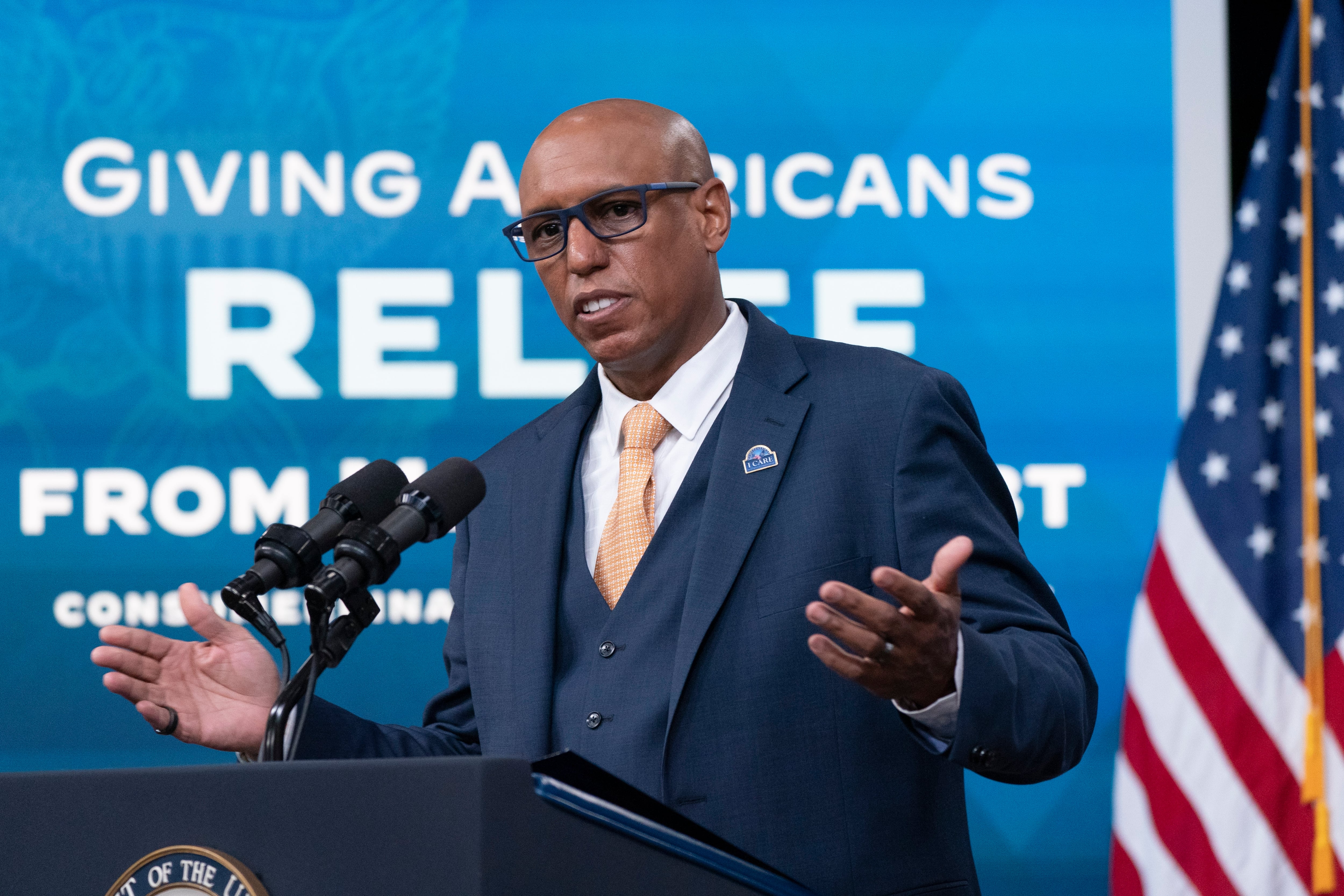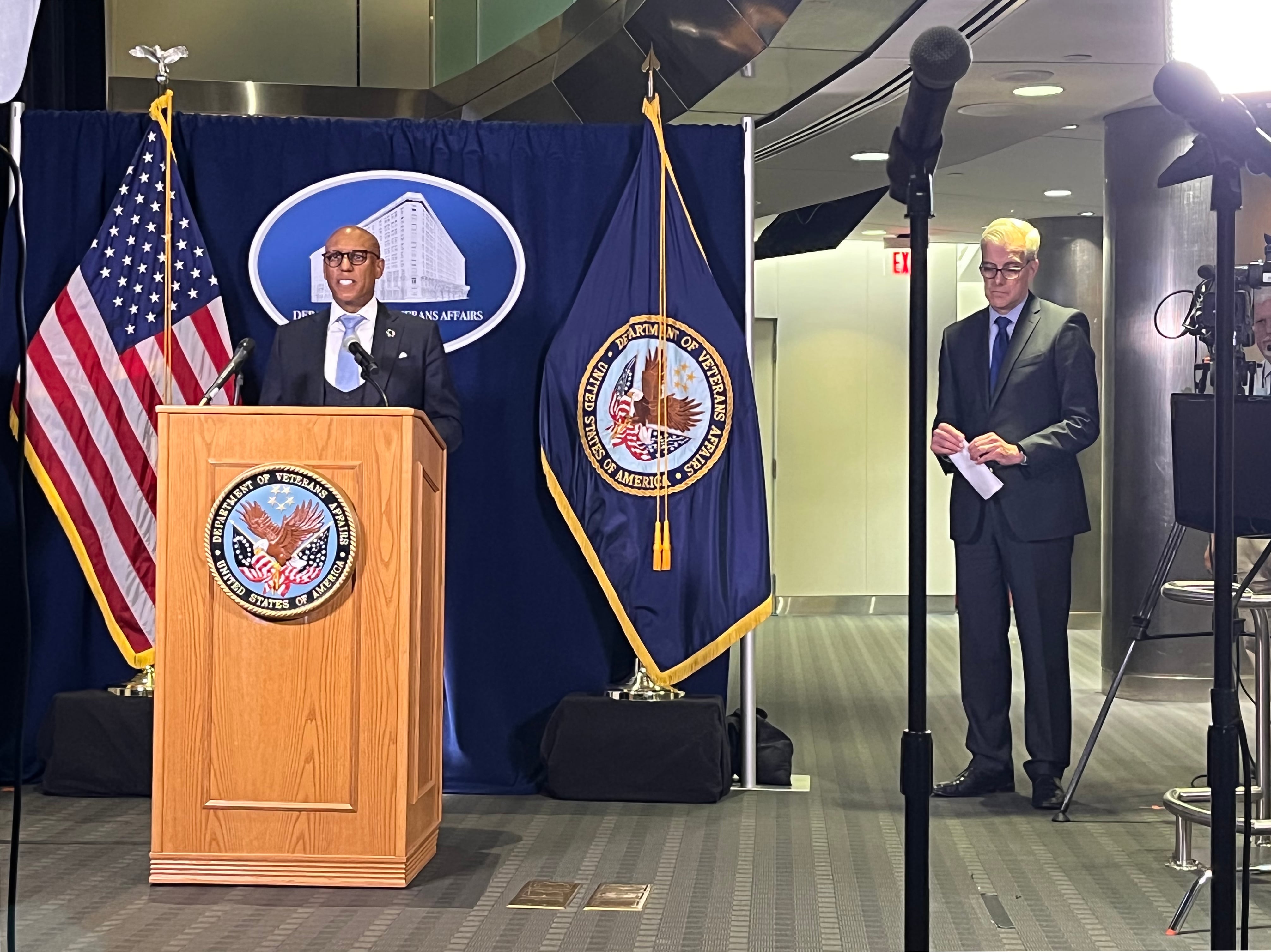Veterans Affairs Deputy Secretary Donald Remy says he’ll still be a champion of department services even after he leaves his leadership post this week.
“My dad still gets his care at VA,” said Remy, the son of a Vietnam War veteran and himself a former soldier. “We’ve been able to use the benefits that VA has to offer as the result of his service. And when I’m no longer in this role, I still can scream from the mountaintops that this VA is here to serve every veteran.”
Remy, in his last interview as deputy secretary, told Military Times that he has seen VA services become more transparent, more efficient and more welcoming in the two years since he stepped into his central office role.
RELATED

He is also confident that change will continue, despite him leaving with unfinished work on issues like the department’s health records modernization project and new caregiver support guidelines.
“If you’ve tried VA before, and you didn’t like what you had or you didn’t enjoy your experience, try again,” he said. “If you’ve never come to VA, now’s the time to do that.”
Portions of this interview have been edited for length and clarity:
Military Times: Talk to me about staff morale and the workforce, because it has been a tumultuous past few years with the pandemic and other challenges.
Remy: The pandemic has taken its toll on all of us, not just at VA but across any sector in America. But the people in this organization have been working tirelessly. We’re providing world-class health care to veterans across the board. And many of the folks that are delivering those services have been there every single day during the pandemic, so you can’t help but have some burnout.
But the mission drives them every single day. The motivation is delivering care to veterans, benefits to veterans. And what we’ve been trying to do is bring more people into this organization that are as committed to that mission, and for those who are already here, lessen the load and lessen the burden as we move forward.
MT: What are the most significant changes you’ve seen at VA in the last two years?
Remy: I’ve had an opportunity to travel the globe, and to visit with veterans to visit with staff. I’ve talked to the people on the ground. I’ve talked to all of our veteran service organizations. What I hear from them. time and time again, is how palpably different [VA] feels to them.
We’ve connected the central office with the field. We’ve connected VA with other agencies throughout the government. We’ve connected with our veterans service organizations so that they can carry forward the messages that we think are important for all of our community to hear. We’re working on assuring that our caregivers understand that they’re an integral part of that health care team. We’re making sure that everyone knows that we’re here for them, all veterans across the board.
RELATED

MT: The new electronic medical records initiative is an issue that you were tasked with even before you were sworn in as deputy secretary. The plan now is to restart this summer, but tell me if you think the modernization effort is getting back to where it needs to be.
Remy: I’m disappointed that we haven’t been able to have a greater level of deployment, and that we’ve had challenges with people, processes and technology. But I know this: The team that’s been working on this electronic health record modernization program has been working tirelessly. And I know that they’re keenly focused on making sure that we have a system that is usable for clinicians, and that enhances outcomes for our veterans.
So we’ve stopped a couple of times, we’ve stopped because we recognize as a high-reliability organization, when we get feedback from those who are providing care, we need to assess that feedback. And we need to get better and move forward. I’m really confident that the team that we have in place, many of whom have been working on this for a very long time, are prepared, and they’re engaged and they’re capable, and they’ll deliver success …
Our clinicians need a system that is usable, and we’re going to hold ourselves accountable to make sure that this system is usable. We’re going to hold the contractor accountable, to make sure that the technology that they’re providing is usable for those clinicians so that we can enhance those outcomes for the vets.
MT: What about convincing folks on Capitol Hill that this is going to work?
Remy: Regardless of how it might sound to others, I am excited about oversight. I believe that’s a critical component of the operation of government. We should be held accountable for making sure that we’re delivering what our veterans expect, and we’re utilizing taxpayers dollars appropriately.
And so, Congress will continue to have hearings, they’ll continue to send correspondence, and we’ll continue … to make sure that they understand what we are doing, the successes we’re having and the challenges that are in front of us.
RELATED

MT: Caregivers are another major initiative that you were thrust into. I still hear from quite a few caregivers who say after the changes in support programs they just don’t know what the next few years are going to bring. Can you just speak to the level of trust that you have with that group?
Remy: We recognize that changes need to be made, and we’re in the process of promulgating the regulations [for caregivers] that will help effectuate changes. At the same time, Congress expanded the program. And so we got our regulatory house in order so that we can bring more people into the caregiver program.
I continue to talk to caregivers and the veterans that those caregivers serve to this day. I still hear some challenges, but I hear more good stories about where we are and what we’re doing.
MT: How’s VA doing on outreach efforts to veterans groups that have been historically kept to the side by the department?
Remy: We’re working hard to make sure that we are serving all veterans. The effort is there and the progress, I think, is palpable. It’s epic.
We just changed our mission statement to reflect the inclusiveness that this administration and this agency has for those who have served our country. And that’s widely regarded as a demonstration of what’s been going on here.
Do we have everything right now? No. Are we working hard to make sure that every vet feels like VA is for them? We absolutely are. If there are any veterans out there who do not feel like they can be served by VA, I want to talk to them. We’re here to serve them.
MT: You’re about to shift from VA deputy secretary to a civilian veteran again. What is your message to other veterans?
Remy: If you’ve tried VA before, and you didn’t like what you had or you didn’t enjoy your experience, try again. If you’ve never come to VA, now’s the time to do that.
We’ve been focused on improving the experience that a veteran has at VA. We recognize that our veteran population today looks a lot different than it may have been years past. The largest growing cohort of veterans is our women veteran population. And so we’re enhancing the care that we provide to those who come to VA for care and those who may never have come to VA before.
We recognize that there are some who are skeptical of VA. I talked to folks in my dad’s generation — he’s a Vietnam vet — and I hear them tell their stories about VA all the time. Some of them are very negative. But this is not your father’s VA, your grandfather’s VA .… Now that I’ve been here, when I’m no longer here, I can scream from the mountaintops that this VA is here to serve every veteran.
RELATED

MT: Do you feel, as a veteran in America, that people understand your experience? Or do you still feel like the military civilian divide is an issue that the country needs to deal with?
Remy: This is something that’s pretty complicated, because there are some people that don’t understand the veteran experience. Those of us who are veterans understand it quite well. And we understand not just our experience, but the experience of our buddies, who similarly served. So it’s on us to make sure we deliver the message about our experience so that the broader American population can have that same understanding or appreciation of what that means.
A veteran is not a broken human being. The veteran is a person who actually has experiences that can help them, help us be a better nation. That’s what we see and that’s who these veterans are, and that’s why we owe it to them to serve them as well as they’ve served us.
We owe it to them to make sure that they’re aware of the benefits and health care that are available to them and they can take advantage of that. Because this veteran population in America today is amazing. And as I said before, is one of the most diverse I believe, veteran populations that we’ve ever seen. They are America.
Leo covers Congress, Veterans Affairs and the White House for Military Times. He has covered Washington, D.C. since 2004, focusing on military personnel and veterans policies. His work has earned numerous honors, including a 2009 Polk award, a 2010 National Headliner Award, the IAVA Leadership in Journalism award and the VFW News Media award.




